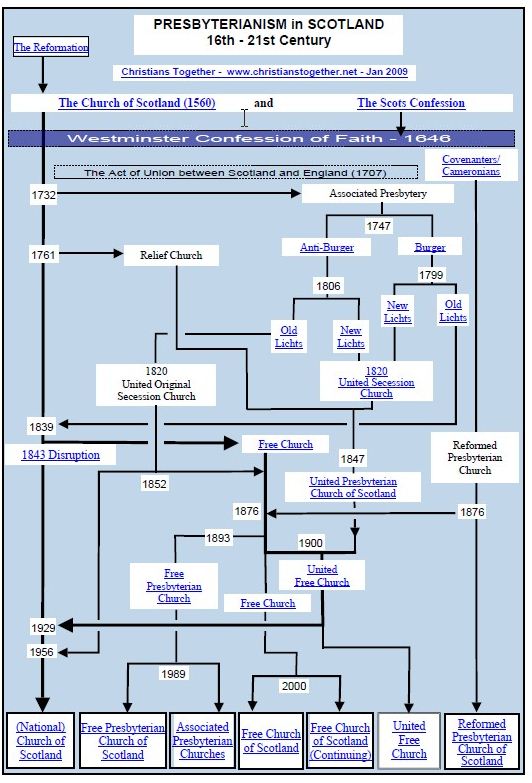 Related Articles
Related Articles
|
|
|
 Websites
Websites
|
|
|
 Files
Files
|
|
|
|
|
Still singing off different 'hymn' sheets
Since the extraordinary Plenary Assembly of last year, the divisions within the Free Church of Scotland on acceptable forms of worship continue to manifest in a variety of ways. A recent letter to a newspaper exposes the contradictions and essentially unbiblical components underlying and undermining both sides of the debate.
 Ed Preface: Ed Preface:
In November 2010, the Free Church of Scotland at a unique 'Plenary Assembly' (the first since the denomination was formed in 1843) decided (on a split vote) to allow individual ministers and congregations freedom to move from the unaccompanied singing of Psalms only, and so permit the use of hymns and instruments in public worship. (This freedom was and is granted under a so-called 'Conscience Clause' allowing liberty of opinion.)
Although a main emphasis of the Assembly was to maintain unity within the denomination (which was most recently split in 2000) the effect has been otherwise. There have been secessions by ministers, elders and members, while letters and statements have appeared on the pages of newspapers, web sites, internet blogs and on social networking forums.
What follows are extracts from a recent letter to the press (black italics) wtih interpolated observations (blue and indented). The letter writer objects to the change that has been made and adheres to the traditional 'psalms only' position.
The left margin of this page contains links to related articles.
----------------
The so-called 'Conscience Clause' that was passed by the recent Free Church of Scotland General Assembly was heralded as the answer for the anomalies created by the Plenary Act of November 2010. The ‘anomalies’ were not created by the Plenary Act of November 2010.
For some [the conscience clause] was the magic bullet that would forge unity within the chaos.
Regarding the ‘magic bullet that would forge unity’, true unity can only be achieved within the context of ‘Truth’. Of course this raises the question of ‘Whose truth?’ and ‘What is Truth?’ and 'Where is it to be found?'
But for others it represented a Rubicon which sealed the departure of the church from an absolute and objective view of Scripture and truth to a subjective and relativised approach to the Word of God.
The WCF is itself a ‘subjective and relativised’ document.
The contradiction inherent in the Plenary Act far from being resolved has only been further aggravated. The issue is not, as some have argued, the denomination that former Free Church members have departed to. The question is rather: What of the Free Church today?
The question is rather: "What of any denomination today that would take a 'name' for itself?"
For the "conscience clause" fails logically and practically to meet its intended aim to resolve the tensions and difficulties the Plenary Act created. We may only worship as we are commanded to and according to the same command or pattern which must govern us all.
“We may only worship as we are commanded”. There are two problems here.
Both sides of the polarised debate claim to be ‘Bible-based’. So logically both can’t be right. And it is very possible, likely even, that both sides are – to one degree or another – wrong.
The second issue is not so much ‘theological’ as it is philosophical: it relates to whether to align with the ‘normative’ or ‘regulative’ principles of worship. (Roughly speaking the former teaches that anything which is not explicitly forbidden is allowed; the latter outlaws anything which is not specifically commanded.)
If a man makes a vow or promise to a particular approach to the worship of God he is obligated, not just by the Formula of the Free Church, but by his fidelity to Christ and His Word, to assert, maintain and defend it against all other contrary interpretations and approaches to the worship of our Creator. It is not possible for a conscience clause to extricate a man from this responsibility.
In the first instance should any man or woman be making ‘a vow or promise’ at all? (Matt 5:34 suggests otherwise). And with regard ‘a particular approach to the worship of God’ the question must be asked ‘Whose particular approach?’ or ‘What particular approach?’.
Then there is also the question: ‘Why is it that some (clergy and elders) take vows when other believers don’t?’
How can a man, even in taking a conscience clause, assert, maintain and defend his position without necessarily opposing those who believe the opposite to what he believes?
This is a non-question and rather states the obvious.
It can never, ever, in a matter of such import, be you have your truth, me mine and we will agree to disagree.
But again ‘Who is the arbiter of Truth?’
That is spiritual and intellectual suicide. A leaven that will ultimately undermine the foundations of any church that embraces it.
The ‘leaven that will ultimately undermine’ is that of pharisaic legalism.
Truth must be truth.
The capitalisation is the wrong way round: ‘truth must be Truth’.
Which takes priority — the public formula or the private conscience clause? If it is the conscience clause then what of the formula?
If the formula takes precedence then the conscience clause is academic for it is the present, authorised, practice that must be asserted, maintained and defended. And as a common, public undertaking that formula must have an objective meaning.
This gets back to ‘the formula’ and the legitimacy of any such formulation. Who writes the formula? And no matter: any ‘formula’ is either extra-biblical (with the possibility of being heretical even) or superfluous.
The people must have a certainty about what is being undertaken before them. If it is subjective and the meaning is determined by the conscience of the man affirming the formula then he can never be held to account.
Ultimately a believer can only be held to account by the Almighty God; and this is the conundrum for any and every denomination with rules, constitutions and highly-prescriptive creedal statements.
Exclusive psalmody as well as Psalms plus songs of human composition, although opposed to one another, are both affirmed as being true at the same time.
Exactly. And what about verbatim singing of Scripture? Is that not 'inspired' praise also?
Either way, the best that can be said about it all is that it is confused and contradictory, the worst, irrational, a Gordian knot which no amount of conscience clauses can untie.
Absolutely.
We must face up to the question honestly. There can be only one pattern.
With regards worship: absolutely not.
Worship is ultimately and expression of the heart. And – while the WCF makes no mention of this aspect – worship can surely be undertaken in, and expressed through total silence.
-------------
Postscript:
What is self-evident in the whole debate and the ensuing division is that both sides of the issue claim a faithfulness to the Bible while disagreeing with one another. Where biblically-literate and God-concious groupings disagree there is surely a suggestion that dogma is to be avoided.
What is also plain is that creedal statements can be good servants but also very bad masters. Semper reformanda (always reforming as required) and Sola Scriptura (the Bible alone) are surely were the emphases should lie.
It would appear that both of these maxims have suffered badly.
Footnotes:
1. It can be safely stated that there are at least seven Presbyterian denominations in Scotland in 2011: chronologically these being:
Church of Scotland (national church and primary product of the Reformation in Scotland in 1560).
The Church is now effectively split (even amongst evangelical ranks) over the decision of the May 2011 General Assembly which effectively gave permission to gay clergy to continue in post provided they were ordained before 2009 and were open concerning their relationships.
Reformed Presbyterian Church of Scotland derived (1690) from the Covenanters of the mid-17th century.
The denomination has just doubled its size when the two congregations grew to four as a result of defections from the Free Church of Scotland. The new congregations are in Glasgow and Stornoway.
Free Church of Scotland (one-third split from the C of S in 1843 over the issues of erastianism and patronage ).
Free Presbyterian Church of Scotland (seceeded from the Free Church of Scotland in 1893 over a perceived relaxation of biblical standards).
Associated Prebyterian Churches came into being in 1989 when a group (of ministers, elders and members) left the Free Presbyterian Church when the latter disiplined a high-profile elder who attended the funeral service of a Roman Catholic friend.
Free Church of Scotland (Continuing) was formed in 2000 when a group (ministers, elders and members) left the Free Church of Scotland on an issue relating to a disciplinary matter which was referred to the secular courts rather than handled within and by the denomination.
 See 'Presbyterianism - Scottish style' which includes chronological chart (now in need of updating) which outlines the history of splits, secessions and reunions from the time of the Reformation (1560) through to 2010. See 'Presbyterianism - Scottish style' which includes chronological chart (now in need of updating) which outlines the history of splits, secessions and reunions from the time of the Reformation (1560) through to 2010.
The chart is in the process of being updated to reflect the current splits in the Church of Scotland (over sexuality) and the Free Church of Scotland on the issue which is the subject of the above article.
|
Christians Together, 30/07/2011
|
|
|
|